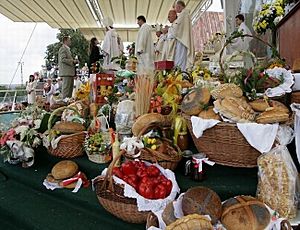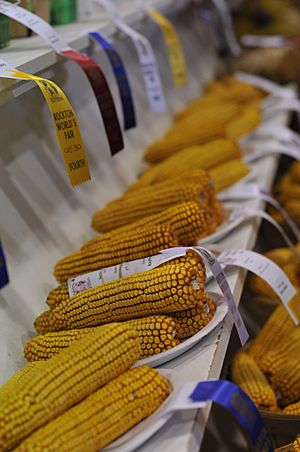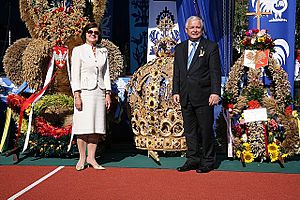Harvest festival facts for kids
The Harvest Festival is a special time when people give thanks for the food grown during the year. It's a way to celebrate a successful harvest, which means gathering crops like fruits, vegetables, and grains from farms.
In Britain, people have celebrated harvests since ancient times. These celebrations often include singing, praying, and decorating churches with baskets of fresh fruit and food. The food collected is often given to people in need, like the poor or elderly, or sold to raise money for the church or charities.
In the USA and Canada, a similar celebration is a national holiday called Thanksgiving. While Thanksgiving in North America has become a holiday for everyone, in Britain, Harvest Festival remains a church celebration focused on thanking God for the harvest.
When is Harvest Festival Celebrated?
The word "harvest" comes from an old Anglo-Saxon word, "haerfest," which meant 'Autumn.' Later, it came to mean the time when farmers gather their crops.
An important part of the harvest season is the Harvest Moon. This is the full moon that appears closest to the start of autumn, usually in September. In ancient times, Harvest Festivals were often held around the Sunday of the Harvest Moon.
Customs and Traditions

Long ago, some Harvest Festivals were celebrated at the start of the harvest season, around August 1st. This was called Lammas, which means 'loaf Mass.' Farmers would make loaves of bread from their freshly harvested wheat. They would then take these loaves to the local church to be used as special bread during a service thanking God for the harvest.
The idea of giving thanks for the harvest traveled to North America with early settlers. One of the most famous harvest thanksgivings was held by the Pilgrims in 1621.
Today, Harvest Festival in Britain is usually celebrated at the end of the harvest season. The exact date can be different in various parts of Britain. Sometimes, nearby churches will hold their Harvest Festivals on different Sundays so that people can attend more than one celebration.
Farmers traditionally ended the harvest with a large meal called a harvest supper. Some churches and villages still hold these suppers today.
The modern way of celebrating Harvest Festival in British churches began in 1843. A vicar named Robert Stephen Hawker invited people to a special thanksgiving service at his church in Morwenstow, Cornwall. Popular Victorian hymns like "We plough the fields and scatter" helped make the idea of Harvest Festival popular. Soon, it became a yearly custom to decorate churches with home-grown produce for the service.
In the past, there were special ceremonies at both the beginning and end of the harvest:
- Church bells would ring every day during the harvest.
- A corn dolly was often made from the last bundle of corn harvested. This corn dolly was given a special place at the harvest feast and kept until the next spring.
- In the West of England, a ceremony called Crying The Neck was practiced. This tradition is still re-enacted today by The Old Cornwall Society.
- The horse pulling the last cartload of crops was decorated with flowers and colorful ribbons.
- A big Harvest feast was held at the farmer's house, with games to celebrate the end of the harvest.
Today, Harvest Festival is celebrated by many people. In Christianity, it is often a focus in schools and churches. It is mainly associated with fruits and vegetables, which people give thanks for. This is the main reason for the Harvest Festival.
See also
 In Spanish: Fiesta de la cosecha para niños
In Spanish: Fiesta de la cosecha para niños
 | William Lucy |
 | Charles Hayes |
 | Cleveland Robinson |



